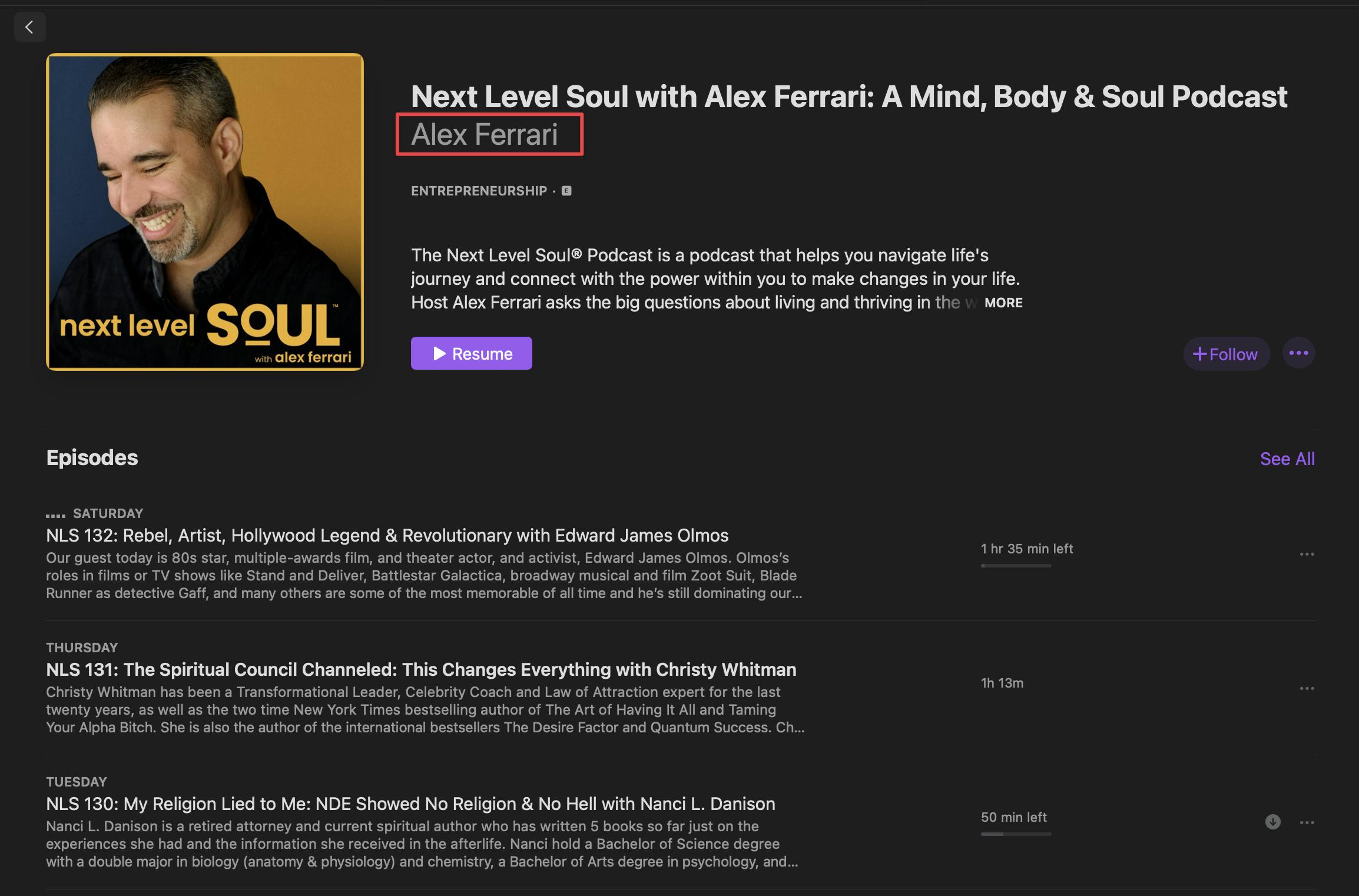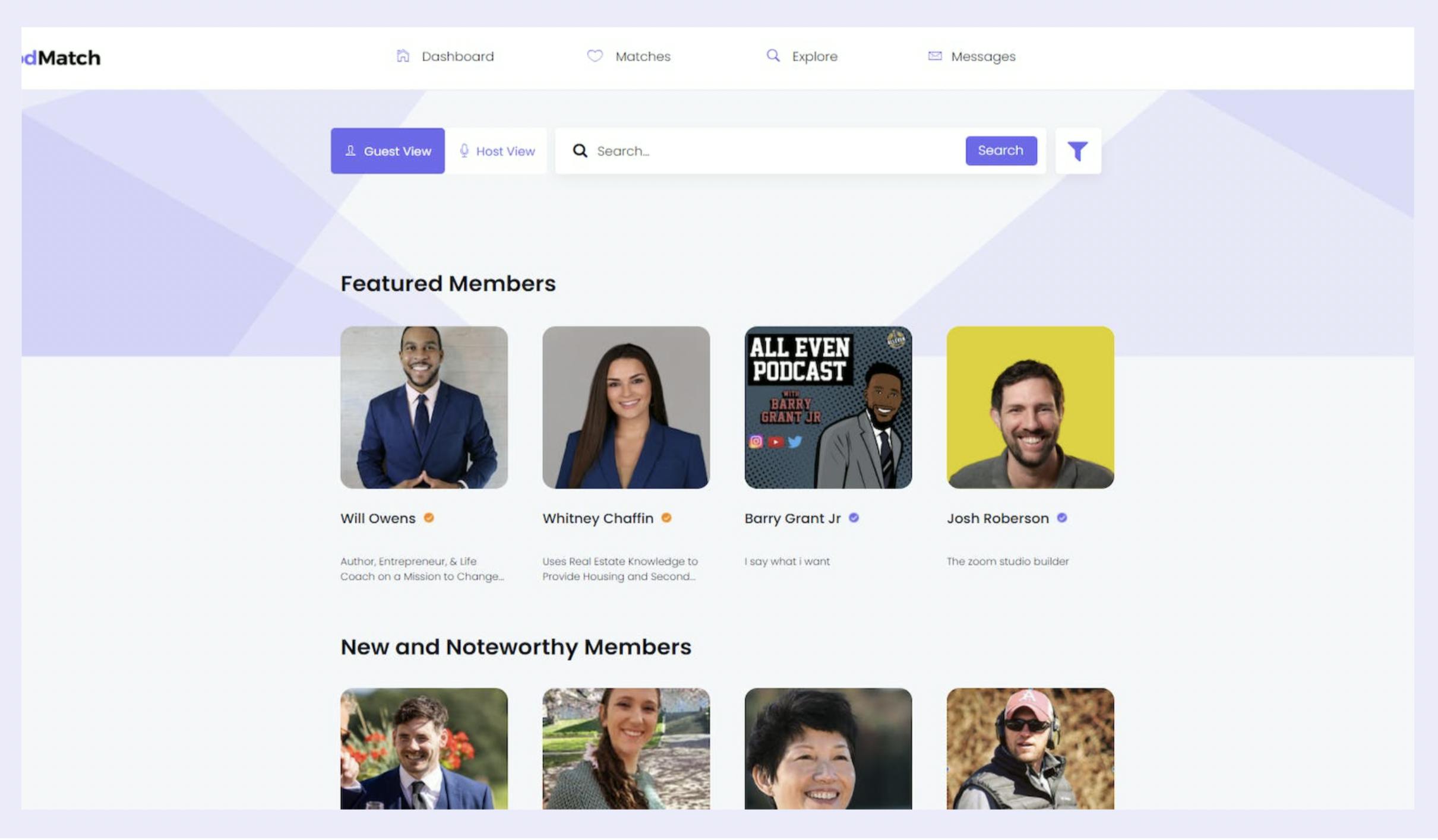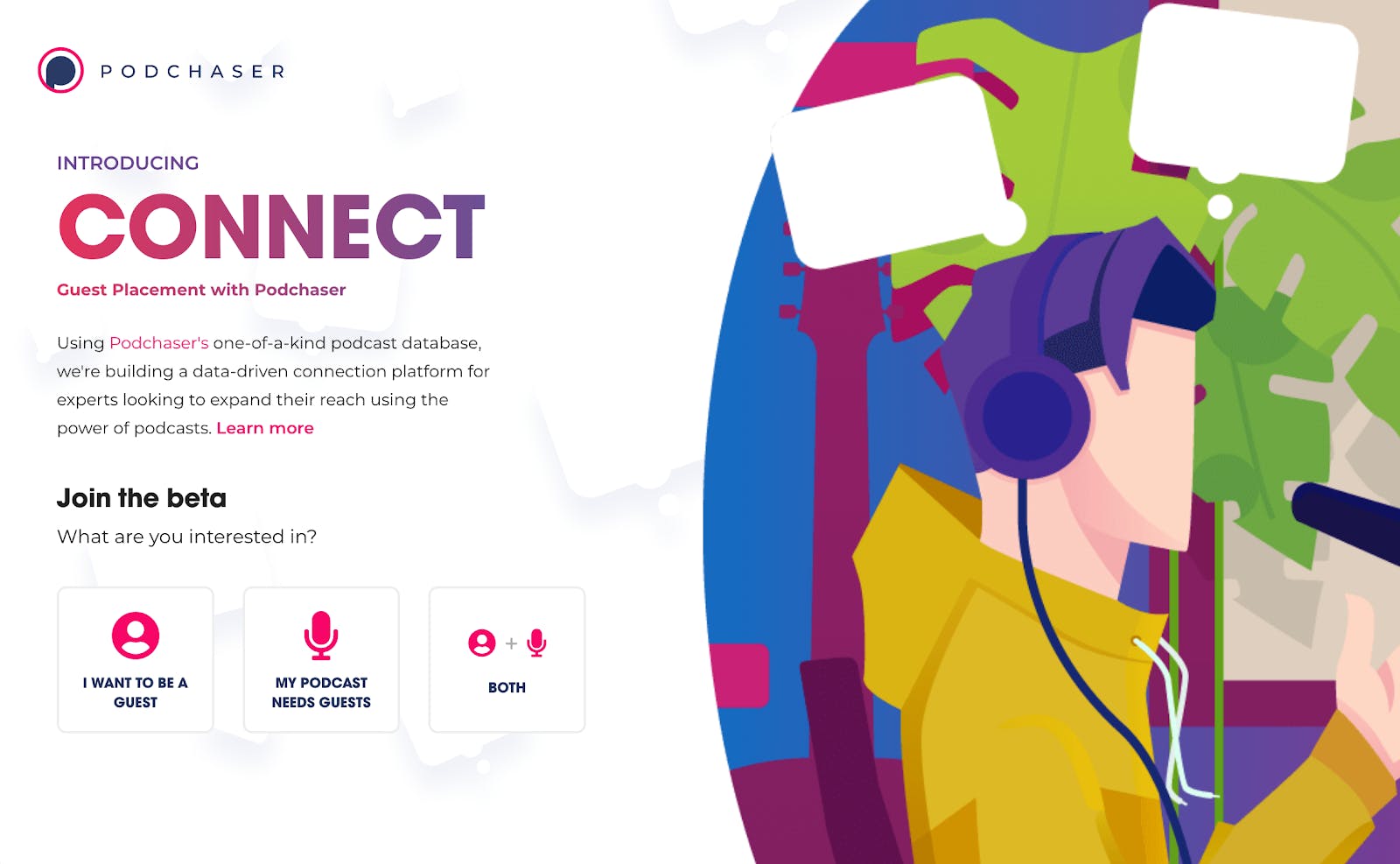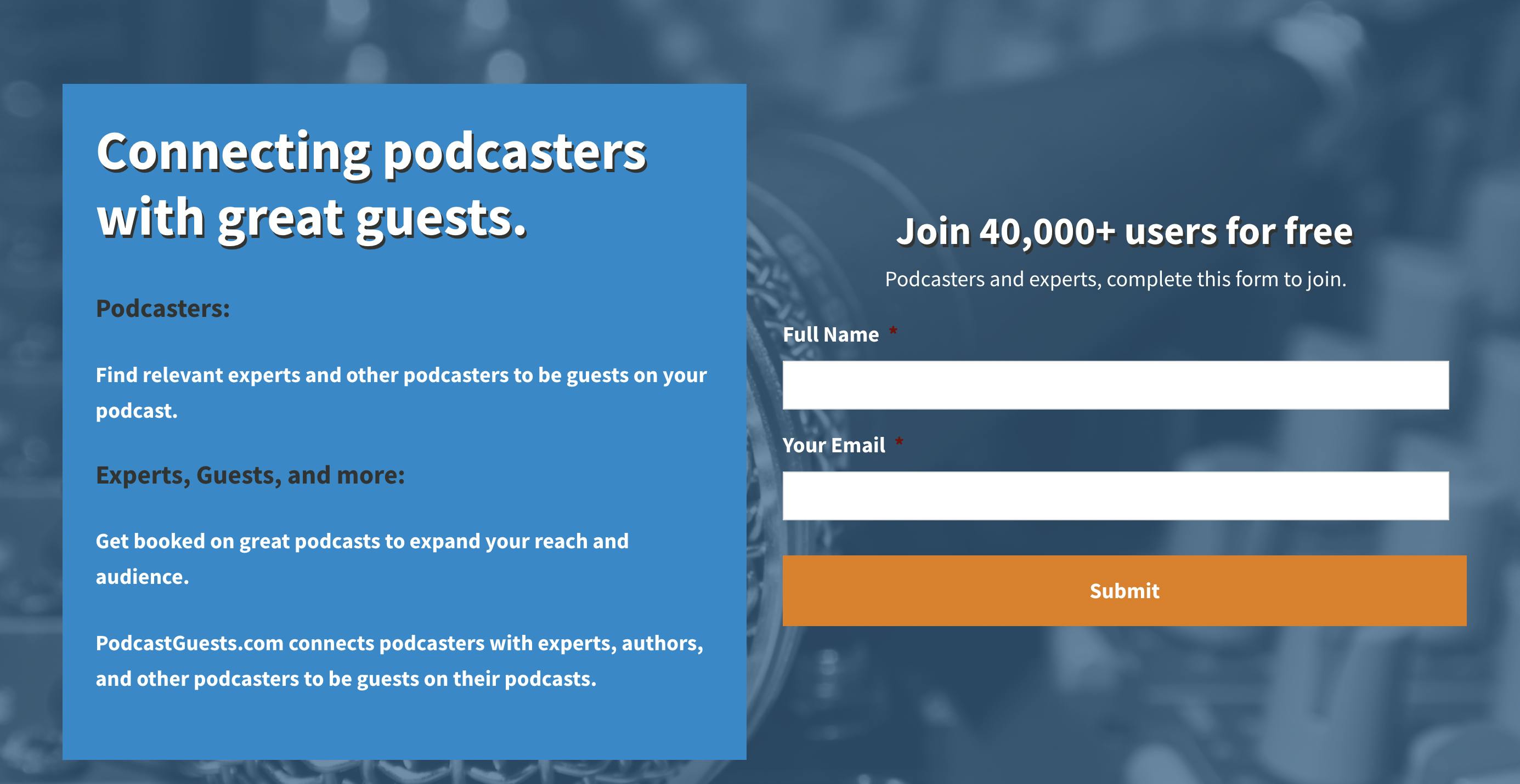
How to Get Booked on Podcasts
Landing podcast guest appearances is an excellent way to market your podcast and speak directly to new listeners in your target audience. Guest podcast interviews also benefit brands, businesses, or experts in a particular field trying to boost their credibility.
But there's an art to getting booked as a guest and being the type of guest other podcasters want to have back in the future. This blog breaks down three ways to get booked on podcasts and reviews everything you need to know to knock your next guest appearance out of the park!
JUMP TO SECTION:
Method #1. Reach out to podcasters
The good news is, a lot podcasters are looking for podcast guests, and make themselves pretty easy to contact. Follow these four steps to find relevant podcasts and pitch to their hosts:
Step 1. Make a podcast wishlist
Make a list of podcasts of roughly 30-40 shows that you feel are the right podcasts for your expertise. If you are a podcaster, look for shows that share similar podcast listeners as your own audience so they'll be more likely to subscribe to your show.
You can find relevant podcasts to pitch to in several different ways:
- Apple Podcasts. Type the name of your podcast in the search bar and click on your show. Scroll down to You Might Also Like to find the top shows related to your podcast. Browse the podcasts listed in this section and take special note of podcasts with guest interviews.
- Listen Notes. For a deeper dive into more niche podcasts, go to ListenNotes.com and enter your podcast's subcategory. You can use the drop-down filter menu to narrow the results.
- Podchaser. Search potential podcasts in Podchaser to make sure the host has featured guests in the past. If they have, you can reach out via the platform as long as you have a Podchaser account.
- Reddit. There are a lot of podcasters on Reddit, and providing valuable comments to their posts can be a great way to get noticed for an interview.
- Facebook groups. Podcasting Facebook groups can be a great networking resource, and some are even dedicated to finding podcast guest opportunites. Just be sure to read the rules of each group before you join.
Make sure to vet the podcasts on your list to ensure you pitch to active podcasts. Check the podcast itself to see when the last episode was published and visit the social media page to make sure they have an active presence there, as well.
Step 2. Find contact info
Now it's time to find the show host's contact information for the shows on your wishlist. Fortunately, nearly every podcast host is online in some way.
You can typically find the host's name on their Apple Podcasts or Spotify page, or in the introduction of one of their episodes. Once you have their name you can typically find them on social media where you can reach out directly.

Here are some ways to contact hosts once you get the host's name:
- Website contact form
- Email (typically available on their website or YouTube channel)
- Podcast's Facebook page
- Personal Facebook profile
- Patreon page
Step 3. Craft your pitch
It takes a little forethought to craft an effective podcast pitch, but you typically get what you put into your pitch emails, so try to spend some time here making it the best it can be. Every solid pitch consists of four distinct parts:
#1. Subject line
Make the subject concise and to the point. It should summarize the topic of the email in a short, succinct phrase. Try to keep it under 60 characters and less than 10 words.
Here are some dos and don'ts:
✅ "Podcast Guest Inquiry: [proposed topic]"
✅ "Alban Brooke Podcast Guest Inquiry: I'd love to connect!"
❌ "Podcast host looking to be featured as a guest on your show"
❌ "I have an idea about something you could interview me about"
#2. Context
The first few lines of your email or message need to convince the podcast host that you have something to offer. Here are some questions you can answer to establish a more meaningful connection and keep them from hitting delete.
- How do you know about them?
- Have you listened to their podcast?
- What do you like about them or their podcast?
#3. The pitch
Once you establish some context, you can go for the ask. Make the ask succinct and clear and be sure to frame it in a way that makes it clear how your appearance will bring value to the host and their podcast.
Example:
"I've noticed that you haven't done an episode talking about ______ yet. I'm an expert on _____ and talk about it frequently on my podcast, ______. I would love to share my knowledge and experience with your podcast audience and dive into (three things you're qualified to talk about relating to the topic)."
It's also a good idea to link to mention your qualifications and link to relevant content where you have discussed this topic before. This could include:
- blog articles
- social media blurbs
- other podcast episodes
- video interviews, etc.
#4. Overcoming objections
Even if you nail the first two parts of your pitch, there's a good chance the podcast host will have at least one objection come to their mind. Here are three common objections and how to handle each.
- "It will be difficult to find a good time". You want to be accommodating of the host's schedule. If they've only got an opening every other Tuesday evening, make it happen. The more available you are, the better.
- "I'm not sure you'll be a strong guest". Send the host a link to an episode of your podcast or and article where you talk about the topic so they can hear what you bring to the table. If you've already landed a few guest interviews, send them links to those as well.
- "What's in it for me?" Make it clear how your appearance will benefit the host. You can tell them that you'll promote your guest appearance on your podcast, to your email list, and on all your social media platforms.
PRO TIP: Once you book an interview, you can use Calendly or ScheduleOnce to confirm and avoid potential time-zone confusion.
Method #2. Use a third-party platform
Podcast guest placement services are like matchmaker services to connect podcasters and guests. Here are three excellent podcast matching services to consider.
PodMatch
Cost: Starting at $29 per month

PodMatch uses A.I. to automatically match ideal podcast guests with podcast hosts to produce high-quality interviews.
Once you create your guest or host account and set up your profile, PodMatch automatically connects you with ideal matches based on your expertise.
Features:
- Public profile page for hosts to find and book you as a guest
- Automatic matching with ideal hosts and podcasts
- Message, book, and schedule interviews directly within PodMatch
Podchaser Connect
Cost: Paid (reach out for details)

Podchaser Connect is a full-service podcast guest placement service. The site uses data-driven matching to sift through their database of over four million shows to connect podcasters with the right guests.
The site is still in beta, so you can fill out their contact form if you'd like to give Podchaser Connect a try.
Features:
- Custom profiles
- Data-driven matching
- Simple placement
- Audience analytics & feedback
PodcastGuests.com
Cost: Free

A PodcastGuest membership gets you listed in their directory, a custom profile, promotes your show in the site's newsletter, and puts your name in front of thousands of like-minded podcasters looking to connect.
Features:
- A profile featuring information about you and your podcast
- Access to other podcasters looking to connect
- Ability to send messages to and receive messages from other podcasters
Method #3. Market yourself as a podcast guest
Marketing yourself as a podcast guest makes it clear you're interested in guest appearances. This is a more passive strategy that can be combined with any of the other outreach methods in this article.
To market yourself as a podcast guest you can:
- Link to a guest request form in social media bio. Put a guest request form, as well as your email address, clearly in the bio of all your social platforms. You can also add this to your podcast or personal website or your podcast episode show notes.
- Post a digital ad. Depending on your budget, you could post a Facebook or Instagram ad marketing yourself as an expert in your field actively looking for podcast guest spots. Digital ads allow you to tailor your ads so you appear to those within your target demographic.
- Content marketing. High-quality content marketing is a great way to lay the foundation for getting noticed by podcasters. If they do a Google search and see your content, they'll be more likely to reach out to you for an interview.
Best practices for being a great podcast guest
A good podcast interviewee comes prepared and delivers engaging content, but a great one takes extra steps to leverage the interview as the valuable networking opportunity it is.
Here are a few ways to be a good podcast guest at the top of their game:
- Have the right equipment: For the best audio quality, use an external mic like the Samson Q2U instead of the mic in your phone or laptop. Get a good pair of headphones to monitor volume levels, and use remote recording software like Zoom, Squadcast, or Riverside.fm.
- Check your equipment and software. Before starting the interview, make sure your equipment is fully charged and you have a strong internet connection. Try to stay in the same place throughout the interview so your wi-fi signal doesn't change.
- Minimize possible background noise. Pick a recording space like a bedroom or closet with lots of clothes or furniture to dampen the sound. Turn off any loud appliances nearby and put your phone on do-not-disturb.
- Do your research. Of course, you should be knowledgeable about the topic you'll be discussing, but it's also helpful to listen to a few episodes of the host's podcast to get a feel for the interview and prepare you for the conversation.
- Be on time. Give yourself plenty of time to do the previous tips so you arrive at the interview prepared and punctual.
Once the interview is over, thank the host for having you on and tell them you will promote the recent episode on your podcast once it's live.
*Download as a Google Doc file to edit the checklist*
Final thoughts
If you're looking to be a guest on a podcast, you have several options:
- reach out to podcast hosts directly
- connect via podcast guest placement services
- market yourself as a podcast guest and wait for creators to reach out
- do a combination of all three strategies
Whichever method you choose, remember that it can take time to get the ball rolling. But once you make a few appearances, you likely find that more opportunities present themselves.
Alban Brooke
Alban Brooke is the Head of Marketing at Buzzsprout and the co-host of Buzzcast. Have any questions about this guide? Reach out on Twitter.
FAQs
How much do you get paid to be a guest on a podcast?
Podcasts do not usually pay guests to be on their show. The benefit of being a podcast guest comes from exposure.
Should I be a guest on a podcast?
Being a guest on a podcast acts as "social proof" that you are a knowledgeable person in your field. Podcast guest appearances can also be a powerful marketing strategy for brands looking to promote their product or service in front of a highly engaged target audience.
How do I get my first guest on a podcast?
To get your first podcast guest, you can:
- browse podcast guest placement services like PodMatch
- search LinkedIn for experts and thought leaders related to your podcast's topic
- search podcast directories like Apple Podcasts and reach out to podcast hosts directly
